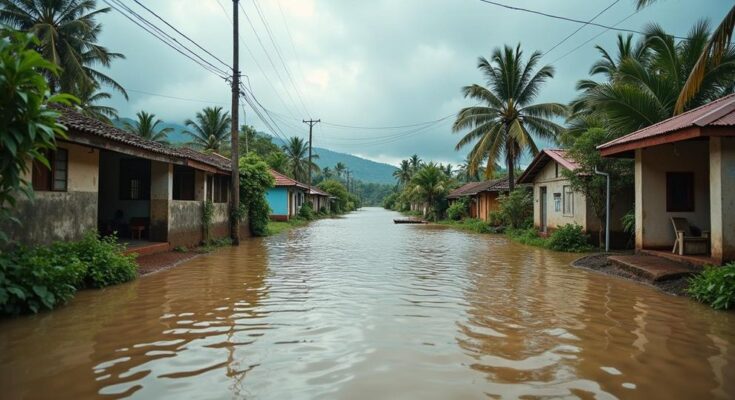West and Central Africa are facing devastating flooding that has resulted in over a thousand deaths and millions affected, particularly in Nigeria, Mali, Senegal, and Chad. Reports indicate severe shortages of food and shelter, with a notable increase in unaccompanied children and fatalities compared to previous crises. The flooding has been attributed to extreme and unexpected rainfall, exacerbated by infrastructural failures, including the collapse of the Alau Dam. Experts emphasize the need for improved resilience and international support to combat the effects of climate change in these vulnerable regions.
In recent weeks, West and Central Africa have been significantly impacted by extreme flooding, resulting in widespread devastation across several nations, particularly Nigeria, Mali, Senegal, and Chad. This catastrophic event illustrates the profound consequences of global climate disruption, as millions of individuals find themselves stranded and homeless. In contrast to the relatively minor impact of flooding experienced by countries in Central Europe, where the death toll is reported at two or three dozen, the situation in Africa has led to over a thousand fatalities. Intern Nana Mohammed from the NYU Science, Health and Environmental Reporting Program provides insight into the disaster from her native northeast Nigeria, which has been heavily affected. Reports indicate that in Borno State alone, where Maiduguri is located, approximately 2 million people have been affected, with many now facing severe shortages of food and shelter. Journalist Isma’il Alfa Abdulrahim, reporting from Maiduguri, described his harrowing experiences during the rescue efforts, noting that many people, including vulnerable children and pregnant women, were trapped in dire conditions. This disaster, he indicated, has resulted in a higher number of unaccompanied children and missing individuals compared to past conflicts, such as the Boko Haram insurgency. The situation is exacerbated by inadequate infrastructure and corrupt practices within the systems designed to manage these crises. Climatologist Dr. Vincent Nduka Ojeh emphasized the extent of the rainfall as unprecedented, leading to the collapse of the Alau Dam, which officials had been warned needed repairs years earlier. The failure of the dam at an early hour during the night caught many residents unprepared, causing sudden and devastating flooding. Dr. Ojeh noted that the government’s negligence in repairing vital infrastructure contributed significantly to the disaster’s severity. In light of these events, it is evident that Nigeria’s vulnerability to climate change is compounded by a lack of financial resources and efficient governance, limiting the country’s ability to adapt to and mitigate future disasters. Dr. Ojeh advocates for a collaborative international approach, with support from developed nations through the proposed U.N. loss and damage fund, which is needed to prevent further loss of life and property in the Global South. Furthermore, it is crucial for Nigeria to enhance its infrastructure to prevent such catastrophes in the future, such as improving drainage systems and constructing flood walls. As the nation grapples with this immediate crisis, the need for a concerted effort to foster resilience against future events is paramount. Community members, as observed by Abdulrahim, exhibit resilience; however, urgent action is required to provide secure housing and stability to those affected. It is essential that officials address these needs promptly while simultaneously planning for long-term adaptations to mitigate climate risks.
The floods in West and Central Africa have highlighted the extreme vulnerability of several nations to climate change and its devastating impacts. Countries like Nigeria, Mali, Senegal, and Chad are among the most affected due to a combination of environmental, social, and economic factors that leave them ill-equipped to face such climatic disasters. The narrative surrounding this tragedy ties back to a broader global context of climate disruption, where extreme weather events are becoming increasingly frequent and severe, illustrating how developing countries face disproportionate consequences due to their limited resilience and resources. This flooding specifically follows a period of drought in the affected areas, showcasing the erratic nature of climate patterns. The failure to maintain critical infrastructure, corrupt governmental practices, and the need for international support further complicate the recovery and rebuilding efforts in these regions.
The catastrophic flooding in Nigeria and other West African nations underscores the pressing challenges posed by climate change, as millions suffer from its immediate impact. With a death toll exceeding a thousand and millions displaced, the event exemplifies how insufficient infrastructure, governmental neglect, and climate variability exacerbate the vulnerabilities of developing nations. The urgent need for repair and reinvestment in resilient infrastructure cannot be overstated. Additionally, the international community must play a role in supporting these nations through funding and resources. Collaborative efforts moving forward are essential to not only address the immediate needs of those affected but also to implement strategies that can mitigate similar disasters in the future.
Original Source: insideclimatenews.org




